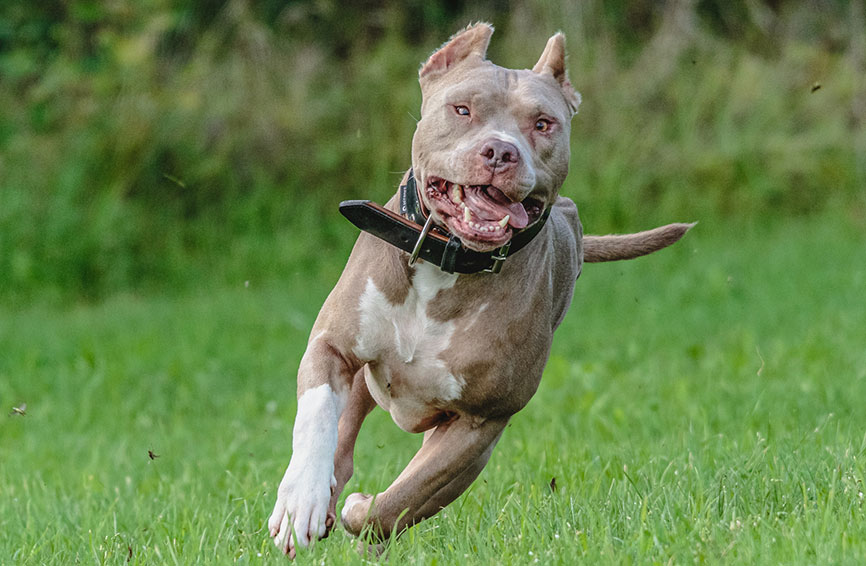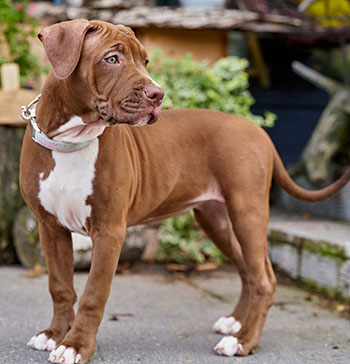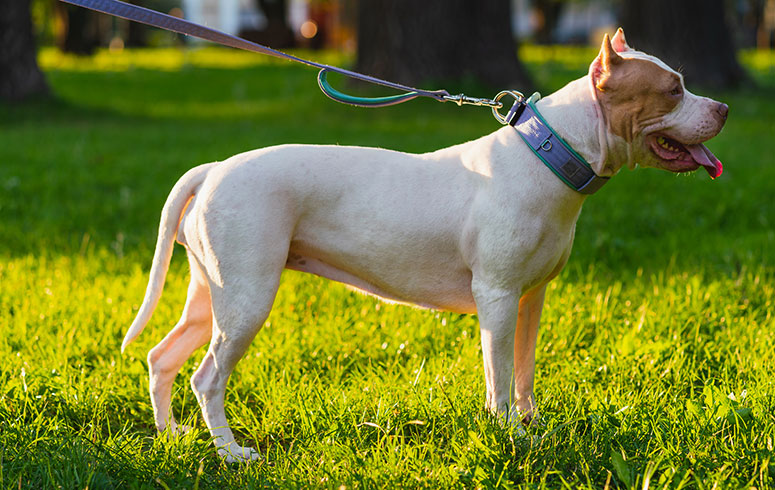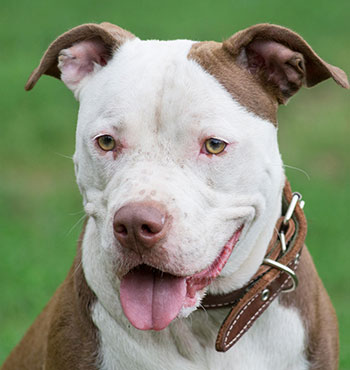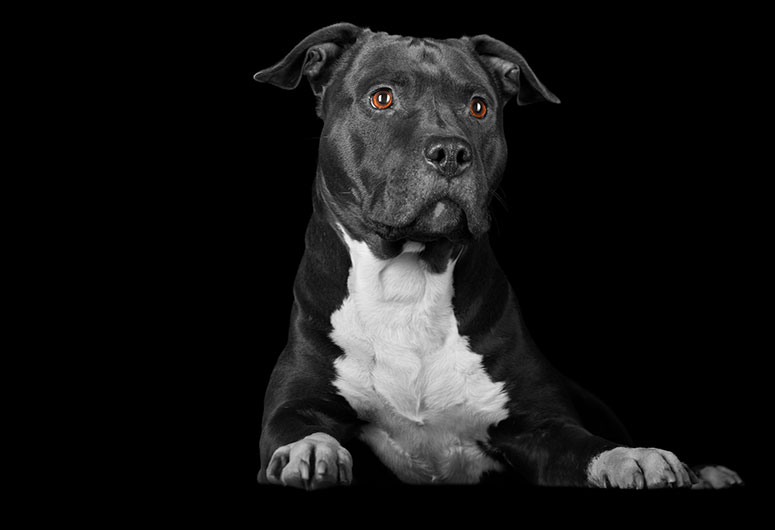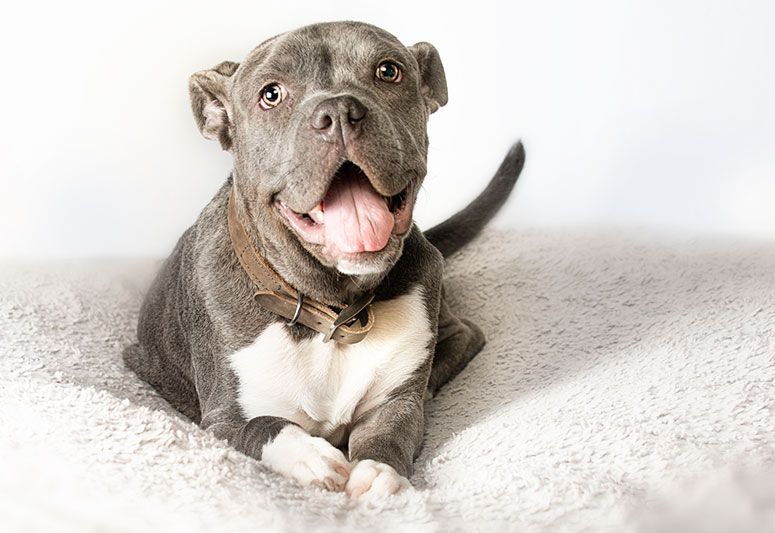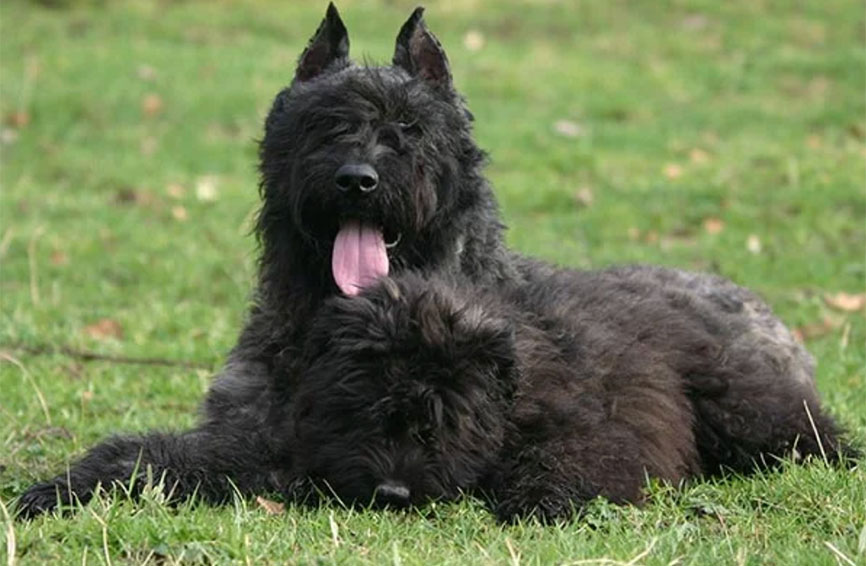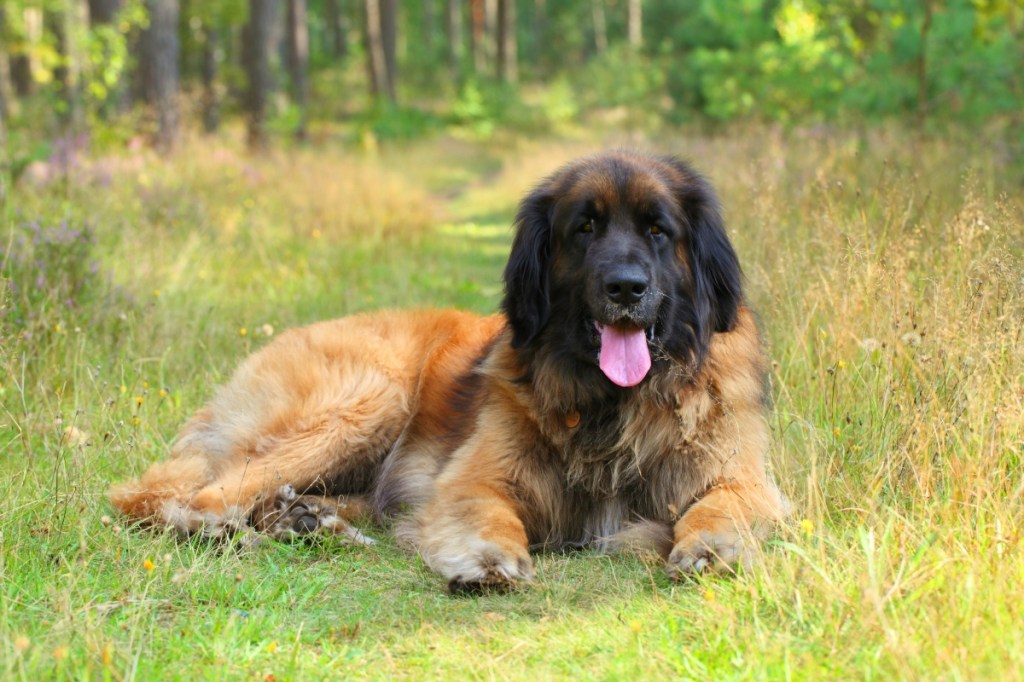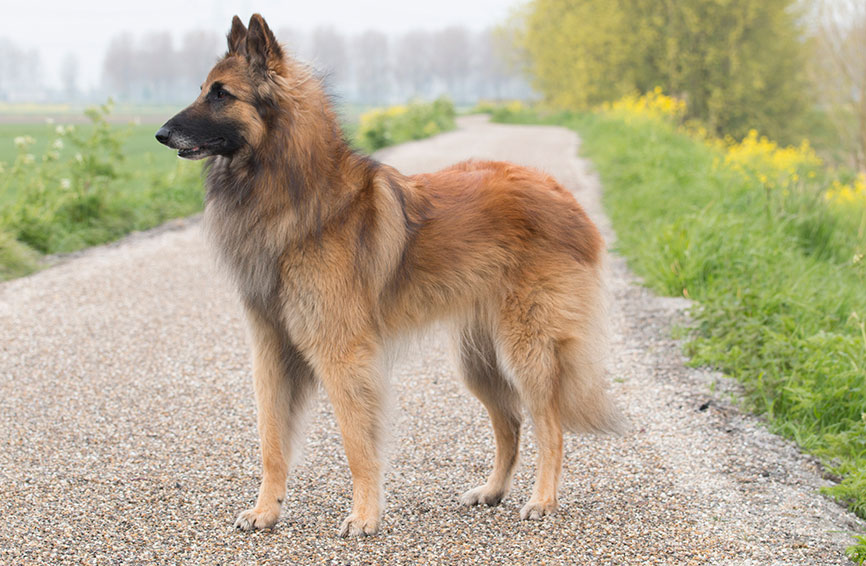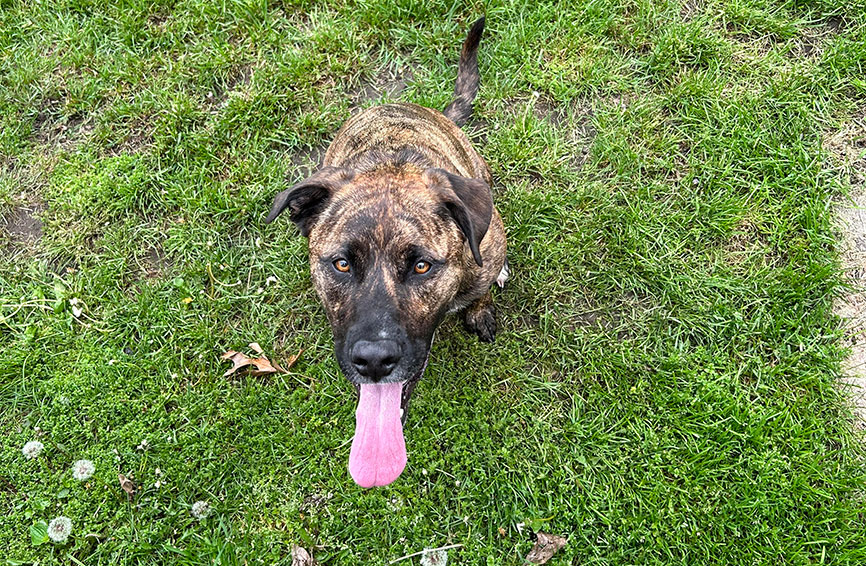Table of Contents
Introduction to American pit bull terriers
American pit bull terriers are among the most misunderstood dogs that exist in our world today. But they are also wonderfully loyal dogs that make excellent household pets and often do very well with children in the house. American pit bull terriers are eager to please, affectionate, low-maintenance, and generally healthy pups. There are various pit bull-type dogs but there are commonalities among them, such as their muscular builds, blocky faces, short coats, and strong prey drive.
If you’ve been curious to learn more about American pit bull terriers and whether this type of dog is right for your lifestyle, read on for information about their temperament, size, required care, and potential health issues.
Size of American pit bull terriers
There is a significant range for height and weight when it comes to American pit bull terriers. Depending on the parent dogs and what breeds have been crossed, these dogs can weigh anywhere between 22 and 78 pounds and reach heights of between 14 and 24 inches tall. On average, males are usually between 35 and 60 pounds for weight, while females are 30 to 50 pounds. Average height for males is 18 to 21 inches, with female heights more like 17 to 20 inches.
To understand how quickly these dogs grow, here is an example of how male and female American pit bull terriers may gain weight during the first year of life and a comparison between the genders:
| Weight Chart | 3 months | 6 months | 9 months | 12 months |
| Male American Pit Bull Terriers | 31.3 pounds | 57.4 pounds | 69.4 pounds | 76 pounds |
| Female American Pit Bull Terriers | 26.7 pounds | 50.1 pounds | 59.7 pounds | 64.2 pounds |
Characteristics of pit bull terriers
American pit bull terriers are moderately adaptable dogs that are sensitive, affectionate with family, and friendly toward strangers. They are easy to groom but prone to shedding, and they can be mouthy if not trained properly. Fortunately, they are fairly easy to train and quite intelligent. These dogs are very playful and intense when they play, so pet parents need to be prepared to get their American pit bull terriers plenty of exercise every day.
As you get to know an American pit bull terrier’s personality, here’s what you can expect based on his or her breed characteristics:
| Breed Characteristic | Level (High, Medium, Low) |
| Affectionate with People | High |
| Good with Kids | High |
| Good with Pets | Low |
| Need for Exercise | High |
| Energy Level | High |
| Intelligence Level | High |
| Able to Be Trained | High |
| Amount of Barking | Medium |
| Amount of Shedding | Medium |
History of American pit bull terriers
Not only are bully breeds of dogs often misunderstood for their temperament and play style, but there is also some discrepancy as to whether the American pit bull terrier is its own breed or the same as the American Staffordshire terrier. American pit bull terrier is not recognized as an official breed by the American Kennel Club, but other canine organizations do recognize it as a distinct breed.
Bull and terrier breeds of dogs date back to the early 19th century in England when the dogs were developed for baiting spectator sports. Dog fighting was practiced because of the aggression that was bred into the dogs’ genetic line. But once those sports became considered inhumane and illegal, bull terriers were seen as strong and protective family dogs, as well as all-around working dogs that were skilled at hunting, guarding, and providing companionship. Unfortunately, some people still engage in the sport of dog fighting today and subject American pit bull terriers and other bully-type dogs to inhumane conditions. A greater awareness of this issue has helped these dogs gain the reputation they deserve and find loving homes with people who truly care about their health and wellness.
American pit bull terrier standard information
Although the American Kennel Club does not recognize this dog as a specific breed, the United Kennel Club is an international dog registry in the UK that does recognize this Terrier Group dog and that outlines breed standard information. The standard provides guidelines for breeders who want to maintain the quality of the breed and improve upon it in humane and responsible ways.
In general, American pit bull terriers are active, muscular, and agile dogs that are skilled in everything from obedience training to dock jumping, weight pulls, tracking, and agility. According to the breed standard, they are solidly built, have coats in a variety of colors and patterns, are very enthusiastic, and not aggressive towards humans.
Here is an overview of the breed standard information for American pit bull terriers:
Head:
- Large and broad head that resembles a blunt wedge
- Large, flat, or slightly rounded skull
- Broad and deep muzzle
- Scissors bite for teeth
- Large and wide nose with open nostrils
- Eyes of medium size, round, and set well apart
- High set ears, natural or cropped
Neck, Topline, Body:
- Moderate length and muscular neck
- Neck skin tight and without dewlap
- Deep and well-filled-in chest
- Topline inclines slightly downward from withers
Forequarters:
- Long, wide, and muscular shoulder blades
- Strong and muscular forelegs
- Short, powerful, straight, and flexible pasterns
- Feet pads hard, tough, and well cushioned
- Dewclaws may be removed
Hindquarters:
- Rump well filled in on each side
- Hock joint well bent
- Rear pasterns straight and parallel
Coat:
- Glossy, smooth, close, and moderately stiff coat
Color:
- Any color or pattern acceptable, except for merle
Gait:
- Jaunty, confident, and expecting excitement
- Effortless, smooth, and powerful trot
Caring for American pit bull terriers
American pit bull terriers will live longer and happier lives when they are well taken care of and kept on a healthy diet and exercise routine. These dogs are easy to train, but they should be trained early to prevent them from becoming aggressive or overprotective of their family members. They live best as house dogs rather than outdoor dogs, especially for long periods of time or during cold weather, which they don’t tolerate very well. These dogs don’t like being left alone for long periods of time, so you may consider crate-training your American pit bull terrier to prevent them from chewing up items in your house.
Here are some general tips for taking the best care of an American pit bull terrier:
Best Living Environments:
- Houses with fenced in yards
- Apartments okay if approved by landlord (no pit bull restrictions) and frequent outdoor exercise is provided
- Families with children
- Do best as the only pet in the house
- Prefer warm (not hot) climates over cold places
Type of Exercise:
- Two long walks per day around the neighborhood
- Playtime in a fenced yard
- Hiking trails with owners
- Short jogs with owners
Mental Enrichment:
- Durable toys that can withstand strong chewing
- Agility courses for stimulation
- Snuggle time with owners
Training Strategies:
- Start training and socialization as early as possible
- Use a crate when gone to prevent chewing
- Provide enough exercise during the day to prevent boredom
Grooming Tips:
- Easy to groom and low-maintenance
- Brush coat once a week to keep it shiny and fresh
- Don’t need hair cuts
- Trim nails if not worn down naturally with outdoor activity
Common health problems of American pit bull terriers
American pit bull terriers are some of the healthiest dogs; however, these resilient dogs are still prone to some hereditary conditions. It comes as a surprise to many people to learn that some pet insurance plans, such as the one offered by Healthy Paws, cover hereditary and genetic conditions, as well as breed-specific conditions, alternative care, and much more.
These are some of the most common health issues that arise with American pit bull terriers:
- Hip dysplasia
- Skin and environmental allergies
- Heart disease, especially aortic stenosis
- Hypothyroidism
Diet and nutrition for American pit bull terriers
The amount of food that you need to feed your American pit bull terrier is determined by the dog’s weight and level of activity. Most of these dogs need 1.5 to 2.5 cups of dry dog food per day, and this total daily amount should be split into two meals for the morning and evening. Recommended dog foods for pit bull-type dogs are Royal Canin, Purina ProPlan, and Hill’s Science Diet.
Where to adopt or purchase American pit bull terriers
American pit bull terriers are some of the most common dogs that you’ll find at animal shelters and rescue organizations. These are very adoptable dogs that are often mixed breeds and that make excellent companions with a little training, love, and compassion. Examples of pit bull rescue groups include Pet-A-Bulls in New Mexico, Bobbie’s Pit Bull Rescue & Sanctuary in the Washington, DC area, Love-A-Bull in Austin, Texas, and Pit Bull Rescue Central.
However, you can also find pure American pit bull terrier puppies for sale from reputable breeders in local communities and with online listings. Some people choose to purchase these dogs rather than adopt for a better chance of the dog having a stable temperament, early socialization, and non-aggressive genetic traits.
Related Breeds
If the American pit bull terrier has captured your heart, you might also be interested to learn about similar and related types of dogs too. Here are some other dogs that pit bull lovers also enjoy getting to know:
- American bulldog
- Bull terrier
- American Staffordshire terrier
- Boxer
- Bullmastiff
Pet insurance for American pit bull terriers
American pit bull terriers have long lifespans of around 12 to 16 years, on average, but a lot of adventures (and misadventures) can happen during those years. These dogs love being outside and exploring new and exciting things, which can lead to accidents and the onset of illnesses that require costly veterinary bills.
Fortunately, Healthy Paws offers American pit bull terrier insurance to help you pay for vet bills when your pup has a bad day or is feeling unwell. Request your dog insurance quote on our website to start planning for your American pit bull terrier’s future.
